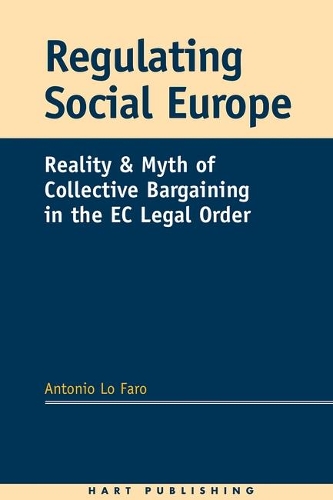
Regulating Social Europe: Reality and Myth of Collective Bargaining in the EC Legal Order
(Hardback)
Publishing Details
Regulating Social Europe: Reality and Myth of Collective Bargaining in the EC Legal Order
By (Author) Antonio Lo Faro
Bloomsbury Publishing PLC
Hart Publishing
1st April 2000
United Kingdom
Classifications
Tertiary Education
Non Fiction
Arbitration, mediation and alternative dispute resolution
341.76
Physical Properties
Hardback
288
Width 156mm, Height 234mm, Spine 22mm
Description
A large part of the legal debate about social integration has been focused on social dialogue, and in particular on the role of European collective arguments, as formerly regulated by the Maastricht Agreement on Social Policy, but now incorporated into the Amsterdam Treaty. This volume attempts to conceptualize the function of European collective bargaining, based around an analysis of the Treaty provisions specifically dealing with collective bargaining, but going beyond the Treaty in several respects. Taking an interdisciplinary approach, the book seeks to broaden the analysis of European collective bargaining, placing it within the broader institutional context of the phenomenon usually referred to as "EC regulatory deficit". Against this background the author recognizes the different factors - legal, theoretical, institutional, political and industrial-relations oriented - which converge in the field of European collective bargaining. The book concludes that in the overall context of a general redefinition of Community regulatory strategies, European collective bargaining should be viewed not as evidence of an incomplete supranational legal pluralism, but rather as a construction of Community law.
Reviews
This original and stimulating study, excellently translated with a minimum of jargon, will be a required sorce for serious students of European 'Social' or 'Labour' Law. the book really covers fully the period up to 1997, we are offered, as a bonus, a remarkably useful frame of reference in which to reflect the seminal developments of 1998 to 2000. -- Bill Wedderburn, QC, FBA * Industrial Law Journal Jul 2001 *
Hart's collection of European law titles is growing steadily, and it is interesting for an English-speaking audience to be presented with scholarship from continental Europe, with which we are perhaps not as familiar as we might be. -- Tamara Hervey * Public Law Jun 2002 *
...the author's approach is rich, drawing not only on legal, but also institutional, political and industrial relations sources. The thesis is compelling...The book offers many insights into the operation of the social dialogue and provides the opportunity for profound reflection on the future of the making of labour law within the European legal order. -- Phil Syrpis * Yearbook of European Law Jun 2002 *
...this book is fundamentally persuasive. The argument is carefully and thoughtfully constructed. The book is well-organized and clear, regularly summarising and reviewing the step-by-step development of the basic thesis. This makes the underlying logic of the book even more transparent, and as a result even more convincing. -- Mark Bell * Maastricht Journal of European and Comparative Law Jun 2002 *
The book is a product of high intellectual quality. There are various theoretical assumptions and conclusions outlined by Lo Faro that have caught my attention for their accuracy and their innovative, analytical, and conceptual approach -- Samantha Velutti * Journal of Law and Society Feb 2003 *
Author Bio
Antonio Lo Faro is a Professor of Law at the University of Catania,Sicily.
